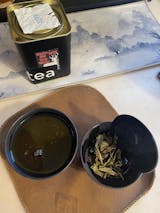Mountain Song
One River Tea
Regular price
$66.00
Sale
Deep in the wilds of South Western Yunnan, wherein the mountains behind the mountains we walked rises Myanmar, the Bada mountain looms like a bastion of language and culture to the Bulang people. Comprising of three villages linked by dirt roads through the mountains, the community here is interwoven and culturally rich. Songs and dance fill the mountains and are as much a part of life as is the tea. Thus, out of respect for the time we spent in the Zhang Lang village celebrating the Bulang New Year, we have called this tea ‘mountain song’ to honor the communal singing and dancing we were allowed to participate in.
In addition to the thick culture, this tea is incredibly deep and hints at powers that will bloom in time. It is probably the juiciest, most fragrant tea we have on offer this year. The leaves have a sappy honey fragrance that is redolent of primrose and gardenia flowers, while there are notes of tropical fruit juice when the dry leaves are placed in a warmed vessel.
Although this tea is of single origin material from Bada Mountain’s core region, Zhanglang Village, we took a chance and blended up a few different ages of trees. The gushu, we found, while being very soothing on the body, had very little fragrance or aroma, something which the qiaomu had in handfuls. We chose a big tree base and blended in good amounts of gushu to give this tea a pleasant ride, while also including some smaller qiaomu to make sure the fragrance slaps. We are very pleased with the results, and after one fragrant session, we’re sure you’ll see why.
This tea is a little wild around the edges, and when brewed, the juicy notes intensify and we catch hints of peat in the cup, some lingering smokiness which will become camphor fragrances in time. The mouthfeel is already pleasantly thick, very oily and rich in the mouth with a pleasant bitterness that quickly becomes a deep huigan.
The art for the cake wrapper was done by the talented Gong Er, a Tujia Minority scholar and artist based in Zhang Jia Jie. This piece in particular is a reference to the singing culture in the mountains, used to communicate things over great distances.
Today was the second time I tried this tea and it's like a little bit of the universe seeped in my cup. It was sweet and smokey and definitely delicious. I would recommend trying this tea it's a tasty treat.










